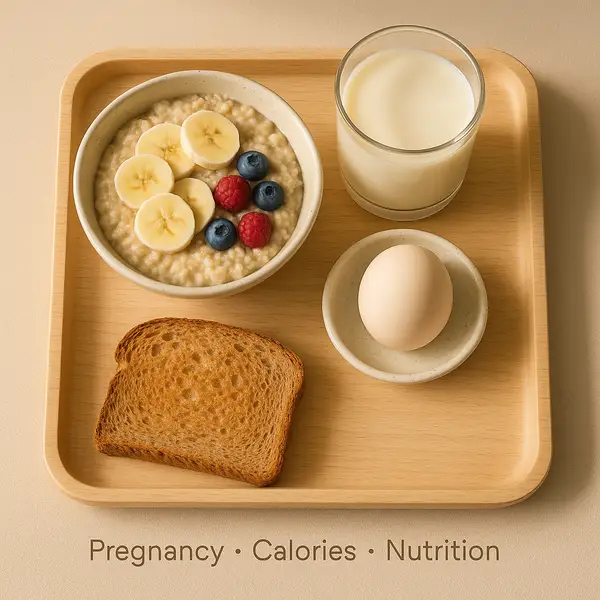Pregnancy isn’t just a glow-up moment—it’s a metabolic marathon. A woman’s body works overtime to support the growing baby, requiring more nutrients and, yes, more calories. But don’t fall into the “eating for two” trap. While caloric needs do increase, it’s about smart fueling, not feasting.
Energy Intake Increase During Pregnancy
The chart compares recommended and observed increases in energy intake during pregnancy. While the Kopp‑Hoolihan study found a moderate rise of +185 kcal/day, UK/WHO suggest slightly more. ACOG guidelines recommend the highest range, highlighting variability in global nutritional guidance.
The baseline calorie requirement for non-pregnant women ranges from 1,800 to 2,400 calories per day, depending on age, activity level, and metabolic health. During pregnancy, especially in the second and third trimesters, those needs rise due to fetal development, increased blood volume, and maternal tissue growth. According to the American College of Obstetricians and Gynecologists (ACOG), most pregnant women need an extra 340 calories per day in the second trimester and about 450 calories extra in the third trimester. ⧉
What 300–500 Extra Pregnancy Calories Actually Look Like
300 kcal
Boiled egg + whole grain toast + apple
340 kcal
Banana + peanut butter + glass of milk
400 kcal
Hummus wrap + baby carrots
450 kcal
Quinoa bowl with veggies and feta
500 kcal
Baked salmon + couscous + steamed spinach
500 kcal (Swap Warning)
Latte + muffin (low nutrient density)
Source: iythealth.com
How Calorie Needs Vary by Trimester
Calories during pregnancy don’t increase evenly across the nine months. In fact, during the first trimester, most women don’t need any extra calories at all. The embryo is tiny, and the body’s energy requirements haven’t shifted significantly yet. That said, morning sickness may impact calorie intake, so quality over quantity becomes the mantra.
Here’s a trimester-by-trimester breakdown:
| Trimester | Additional Daily Calories Needed | Total Average Daily Intake |
|---|---|---|
| First | 0 | 1,800–2,400 |
| Second | +340 | ~2,140–2,740 |
| Third | +450 | ~2,250–2,850 |
Keep in mind, women carrying twins or multiples need significantly more. For twins, the daily calorie increase can range from 600 to 1,000 extra calories depending on body type and weight gain goals. ⧉
U.S. Average Caloric Intake per Trimester
This chart shows the actual average daily caloric intake among pregnant women in the U.S. by trimester. Caloric needs clearly increase as pregnancy progresses, with the third trimester reaching the highest average of approximately 2400 kcal/day.
Factors That Influence Caloric Requirements
Not all pregnancies are created equal. Several factors play into how many calories a pregnant woman should consume:
- Pre-pregnancy BMI: Underweight women need more calories to achieve healthy weight gain, while women with a higher BMI may need less.
- Physical activity level: An active mom-to-be will burn more energy and may need more fuel to sustain both her and the baby.
- Age and metabolism: Younger women tend to have faster metabolisms, but that isn’t universal. Genetics and hormonal factors also play a role.
For example, a 28-year-old woman from Austin, TX, who runs three times a week and began pregnancy with a BMI of 20.5, was advised to increase her intake to nearly 2,800 calories during her third trimester. This adjustment helped her maintain energy levels and promote optimal fetal growth.
Reyus Mammadli, a medical consultant, notes, “Monitoring caloric needs isn’t just about numbers. It’s about observing how a woman feels, how she gains weight, and how the baby is growing. Adjustments should be fluid.”
Nutrient Density: Quality Over Quantity
Let’s face it—not all calories are created equal. A bag of chips and a quinoa bowl may deliver the same calorie count, but the nutritional impact? Worlds apart.
Pregnant women should focus on nutrient-dense foods that deliver essential vitamins and minerals. Think lean proteins (like chicken and lentils), healthy fats (like avocados and olive oil), whole grains, and a rainbow of fruits and vegetables. The goal is to pack every bite with purpose.
The American Pregnancy Association recommends:
- 71 grams of protein per day
- 27 mg of iron
- 1,000 mg of calcium
- 600 mcg of folic acid
And yes, hydration counts too. Water aids in digestion, nutrient transport, and can even reduce the risk of urinary tract infections. ⧉
Smart Snacking and Meal Timing
Cravings happen. But they don’t have to derail nutrition goals. Smart snacking can bridge hunger gaps and maintain stable blood sugar levels. Below is a practical and budget-friendly 3-day meal and snack guide designed specifically for pregnant women in the second or third trimester aiming for 2,400–2,600 daily calories.
Day 1 – Balanced & Bright
Breakfast:
- Oatmeal with sliced banana and 1 tbsp almond butter – 320 kcal
- Boiled egg – 70 kcal
Snack:
- Greek yogurt (6 oz) with blueberries – 150 kcal
Lunch:
- Grilled chicken wrap with whole wheat tortilla, lettuce, tomato, hummus – 420 kcal
- Apple – 95 kcal
Snack:
- Handful of almonds (1 oz) – 160 kcal
Dinner:
- Baked salmon (4 oz) – 233 kcal
- Quinoa (1 cup cooked) – 222 kcal
- Steamed broccoli (1 cup) – 55 kcal
Daily Total: ~1,725 kcal (excluding beverages)
Optional Evening Snack:
- Low-fat cheese with whole grain crackers – 250 kcal
- Orange – 80 kcal
Total with Snacks: ~2,400 kcal
Day 2 – Comfort with a Crunch
Breakfast:
- Scrambled eggs (2) with spinach and toast – 290 kcal
- Fresh pear – 100 kcal
Snack:
- Cottage cheese (1/2 cup) with sliced peaches – 150 kcal
Lunch:
- Turkey and avocado sandwich on whole grain bread – 480 kcal
- Baby carrots – 35 kcal
Snack:
- Trail mix (1/4 cup) – 170 kcal
Dinner:
- Stir-fried tofu with mixed veggies over brown rice – 500 kcal
Optional Evening Snack:
- Rice cake with peanut butter – 180 kcal
- Glass of skim milk – 90 kcal
Total with Snacks: ~2,500 kcal
Day 3 – Simple & Satisfying
Breakfast:
- Whole grain cereal with milk – 240 kcal
- Banana – 105 kcal
Snack:
- Boiled egg and small handful of walnuts – 200 kcal
Lunch:
- Lentil soup with whole grain bread – 420 kcal
- Side salad with olive oil – 120 kcal
Snack:
- Hummus (3 tbsp) with cucumber and whole grain pita – 180 kcal
Dinner:
- Grilled chicken breast (4 oz) – 187 kcal
- Mashed sweet potatoes (1 cup) – 200 kcal
- Green beans (1 cup) – 44 kcal
Optional Evening Snack:
- Yogurt smoothie with strawberries – 220 kcal
Total with Snacks: ~2,450 kcal
Spacing meals every 3–4 hours helps avoid energy crashes and supports steady nutrient absorption. This is especially helpful for those struggling with heartburn or gestational diabetes.
Reyus Mammadli advises, “Smaller, more frequent meals are often better tolerated in pregnancy, especially as the uterus expands and crowds the stomach.”
Medical Monitoring and Personalized Plans
Regular check-ups with a healthcare provider are crucial to ensure both mother and baby are thriving. Most OB-GYNs will monitor weight gain, fundal height, and fetal development as indicators of whether caloric intake is on track.
Advanced tools like bioelectrical impedance analysis (BIA) and resting metabolic rate (RMR) testing can provide more tailored calorie targets. These methods, with accuracy scores of 8/10 and 9/10 respectively, are increasingly used in OB clinics across the U.S. ⧉
For instance, a 35-year-old woman in Chicago with gestational diabetes underwent RMR testing and had her calorie needs adjusted downward slightly to help manage blood glucose without compromising fetal growth. It’s a balancing act, and precision tools make it safer.
Percentage of Women Meeting Calorie Guidelines
This chart illustrates how pregnant women align with recommended caloric intake. Only about 30% meet the guidelines, while the majority either fall below or exceed recommendations, indicating a gap in dietary adherence or awareness.
Editorial Advice
Reyus Mammadli, medical consultant, recommends that pregnant women approach calorie tracking as a guideline, not a rulebook. “Each body reacts differently to pregnancy,” he says, “so it’s important to adjust based on clinical signs and not just stick to textbook numbers.”
A few final takeaways:
- Use a pregnancy-specific nutrition tracker app to monitor intake.
- Include a dietitian in your prenatal care team if possible.
- Don’t ignore signals like fatigue, dizziness, or unusual cravings—they may be signs your body needs more (or less) fuel.
In short: calories matter, but context matters more. Keep it balanced, nutrient-packed, and responsive to your changing needs.
About the Author
Reyus Mammadli is the author of this health blog since 2008. With a background in medical and biotechnical devices, he has over 15 years of experience working with medical literature and expert guidelines from WHO, CDC, Mayo Clinic, and others. His goal is to present clear, accurate health information for everyday readers — not as a substitute for medical advice.







